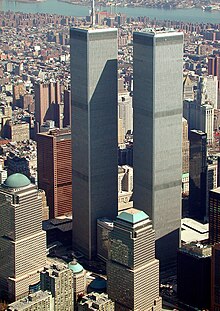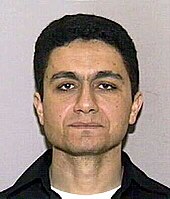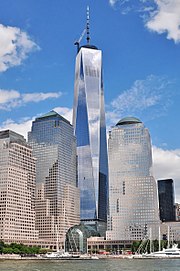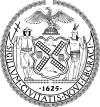September 11 attacks
| September 11 attacks | |
|---|---|
| Part of terrorism in the United States | |
United Airlines Flight 175 hits the South Tower. Flight 77 hits the Pentagon. Fuselage of Flight 93 in Stonycreek World Trade Center site after the attacks The Pentagon building on fire | |
| Location |
|
| Date | September 11, 2001 c. 08:13 am[b] – 10:03 am[c] (EDT) |
| Target |
|
Attack type | Islamic terrorism, aircraft hijacking, suicide attack, mass murder |
| Deaths | 2,996[d] (2,977 victims + 19 al-Qaeda terrorists) |
Injured | 6,000–25,000+[e] |
| Perpetrators | al-Qaeda led by Osama bin Laden (see also: responsibility) |
No. of participants | 19 |
| Motive | Several; see Motives for the September 11 attacks and Fatwas of Osama bin Laden |
| Convicted | |
| September 11 attacks |
|---|
 |

The September 11 attacks (also known as 9/11)[f] were a series of four coordinated Islamist suicide attacks carried out as an act of terrorism by the militant group al-Qaeda against the United States of America. The attacks happened on the morning of Tuesday, September 11, 2001, and were done by 19 terrorists. The attacks killed 2,996 people (including the attackers),[5] making it the deadliest terrorist attack in human history.[6] They caused more than $10 billion in damage to infrastructure.[7][8][9][10][11] The terrorists took control of 4 passenger airplanes to destroy 3 famous buildings, the Twin Towers and part of the Pentagon, by flying the planes into them. There were two attacks in New York City and one in Arlington, Virginia. The fourth attack, aimed at Washington, D.C. did not work and the plane crashed in a field near Shanksville, Pennsylvania. The Twin Towers collapsed as a result of the crashes.
The buildings attacked were the World Trade Center's Twin Towers in New York City and the Pentagon in Arlington, Virginia. The fourth plane crashed in an empty field in Pennsylvania before it could reach its target in Washington, D.C. That target was either the White House or the United States Capitol.[12] After the event, the United States government said the people who had done the attacks were associated with the Islamist terrorist group al-Qaeda and the attacks had been organized by its leader Osama bin Laden.
The September 11 attacks are commonly attributed as the event that made the War on Terrorism begin.
Airplanes involved
[change | change source]
The first of the four planes to take off was American Airlines Flight 11, a Boeing 767-200ER. It was 159 feet (48 m) long and 16 feet (4.9 m) wide. It had two aisles. The plane made daily flights between Boston and Los Angeles. When it took off at 7:59 a.m. on the morning of September 11, it carried only 81 passengers in its 158 seats, along with 11 crew members. Forty-seven minutes later, it crashed into the North Tower at 440 miles per hour (710 km/h). It was carrying 9,717 gallons of jet fuel, 14,000 fewer than it was able to carry.
United Airlines Flight 175, also a Boeing 767-200ER, was the second. Like American Airlines 11, it was scheduled to fly from Boston to Los Angeles. When United 175 took off at 8:14 a.m., it was even lighter than the American flight: Only 56 of 168 seats were filled. Nine crew members were onboard. When it crashed into the South Tower of the World Trade Center at 9:03 a.m., traveling 540 miles per hour (870 km/h), it had 9,118 gallons of fuel in its tanks. This crash was broadcasted live on many television channels worldwide that were already showing the North Tower burning.[13]

American Airlines Flight 77 was the third plane to take off. It was a Boeing 757-200. It left Washington, D.C. at 8:20 a.m. going to Los Angeles. It was two-thirds empty, with 58 passengers in its 176 seats. Six crew members were onboard. It was carrying 4,000 gallons of fuel, less than the 11,500 gallons it could carry. It crashed into the Pentagon at 9:37 a.m., flying at 530 miles per hour (850 km/h).
The fourth plane, United Airlines Flight 93, was also a 757-200. It was traveling from Newark, New Jersey to San Francisco. It was scheduled to leave at 8 a.m., but was delayed for 42 minutes. When it finally took off, it carried only 37 passengers in its 182 seats, as well as seven crew members. It had a little over 7,000 gallons of fuel. At 10:03 a.m, it crashed at 560 miles per hour (900 km/h) into an empty field near Shanksville, Pennsylvania after the passengers and crew unsuccessfully attempted to retake control of the plane to stop the hijackers from hitting another landmark.
Deaths
[change | change source]
All of the 265 people on the four planes died in the crashes. The 19 terrorists were also killed in the attacks. Both towers of the World Trade Center caught on fire when the planes crashed into them. The South Tower (2 WTC) burned for 56 minutes before it fell and was destroyed. The North Tower (1 WTC) burned for 102 minutes before it also fell. As the towers fell, parts of the towers hit other buildings around them. Some of the parts (which were very hot) made a third building, 7 World Trade Center (7 WTC), fall at 5:20 p.m due to fires. Many other buildings in the area were damaged badly and had to be demolished later, leaving the whole World Trade Center complex destroyed.
The plane that hit the Pentagon hit the ground just as it hit the western side of the building. It then crashed through three of the five "rings" that make up the Pentagon. The crash killed 125 people in the Pentagon.
There were 2,996 people in total who died in the attacks. Among those dead included more than 300 firefighters, 8 medics and over 70 police officers who were trying to save people inside the Twin Towers.
In 2023 the US Centers for Disease Control and Prevention say that more than 125,000 responders and survivors are suffering from long-term health problems caused by the attack. Most of these diseases were caused by breathing asbestos which had been sprayed on the ceiling trusses for fireproofing when the towers were built. Nearly as many firefighters have died from these illnesses as died in the attacks.[14]
Outcome
[change | change source]The United States government paid an average of $1.8 million to the families of the victims of the attacks.[15][16][17]
The attacks also led to the United States Department of Homeland Security being created, which protects the country from terrorist attacks.
Many conspiracy theories have appeared which say that certain people in the United States government knew about the attacks, or even made them happen. These have been said to be false by the government.
War on Terror
[change | change source]After the attack, the United States blamed al-Qaeda, which the U.S. thought was a terrorist group. President George W. Bush said he would start a "War on Terror". He meant that the United States would do more things to try to stop terrorism in the future. Bush said this was meant to protect Americans and their property from terrorists. For example, the American government would be reorganized. Security and control in public places was made stronger, especially at airports. Americans were told every day whether there was a serious threat of terrorism. (This was done by giving a color for the day. Red meant there was a high risk, green meant a low risk, and there were many levels in between.)
The War on Terror also led to real wars. The leader of al-Qaeda, Osama bin Laden, lived in the Islamic Emirate of Afghanistan. The United States told the government of Afghanistan, called the Taliban, to turn bin Laden over to them. The Taliban would not do this. The leader of the Taliban, Mullah Muhammad Omar, demanded to see proof from the United States government. If proof was not given, Mullah Omar said that he would not hand over bin Laden. President George W. Bush said that he did not need to provide proof.[18] The United States then went to war against Afghanistan. The Taliban was removed from power, a new government was put in power, and a new president was chosen by the people of Afghanistan.
While this was happening, the United States government changed in a few ways. The United States Department of Transportation (DOT) created the Transportation Security Administration (TSA). Before 9/11, security at American airports was provided by the airlines. The TSA made it the government's job to provide airport security. New officers were hired by the TSA to work at airports and to fly on planes as air marshals. The TSA also provides security on American trains and subways. A new Department of Homeland Security was also created. It became their job to protect Americans and their property inside the United States. When this department was created, the TSA moved from the DOT to Homeland Security.
After defeating the Taliban, President George W. Bush thought the US should invade Iraq. He believed that Iraq helped terrorist groups, including al-Qaeda. He said he had evidence that Iraq was also making weapons of mass destruction. He sent Secretary of State Colin Powell to the United Nations to show them some of the evidence. In March, 2003, the United States began its invasion of Iraq. (Four other countries also took part, including the United Kingdom, Australia, Poland, and Denmark.) The government of Iraq was overthrown, and the people of Iraq elected a new government. No weapons of mass destruction were ever found in Iraq.

On May 2, 2011, United States Navy SEALs killed al-Qaeda leader Osama bin Laden, who led the September 11, 2001 attacks and other terrorist attempts.
Water rescues
[change | change source]During the tragic events of September 11, 2001, many people were evacuated from Lower Manhattan,[19] including from the area around the World Trade Center, where the Twin Towers collapsed. The Hudson River played a significant role in the rescue efforts.
Various vessels, including ferries, private boats, and even Coast Guard vessels, were used to evacuate thousands of people from Manhattan to safety across the Hudson River to New Jersey.[20] "In all, nearly 500,000 people were evacuated that day, more than the 339,000 rescued at Dunkirk. Some 150 different vessels, crewed by more than 800 American mariners, improvised and successfully executed this extraordinary feat of bravery."[21]
This spontaneous maritime evacuation was a crucial aspect of the response to the attacks, providing an escape route for many who were stranded in the chaos of Lower Manhattan.
Investigations
[change | change source]FBI
[change | change source]
Immediately after the attacks, the Federal Bureau of Investigation started PENTTBOM. This was the biggest criminal investigation in the history of the United States. At one point, more than half of the FBI's agents worked on the investigation and followed a half-million leads.[22] The FBI concluded that there was "clear and irrefutable (cannot be denied)" evidence linking al-Qaeda and bin Laden to the attacks.[23]
| Nationality | Number |
|---|---|
| Saudi Arabia | 15
|
| United Arab Emirates | 2
|
| Egypt | 1
|
| Lebanon | 1
|
The FBI did not record the 2,977 deaths from the attacks in their annual violent crime record for 2001.[24] New York City also did not include the deaths in their annual crime statistics for 2001.[25]
CIA
[change | change source]The Inspector General of the Central Intelligence Agency (CIA) did a review of the CIA's pre-9/11 performance. He was very critical of senior CIA officials for not doing everything possible to stop terrorism. He criticized their failure to stop two of the 9/11 hijackers, Nawaf al-Hazmi and Khalid al-Mihdhar, as they entered the United States. He also criticized their failure to share information on the two men with the FBI.[26] In May 2007, senators from both major U.S. political parties wrote legislation to make the review public. One of the backers, Senator Ron Wyden said, "The American people have a right to know what the Central Intelligence Agency was doing in those critical (important) months before 9/11."[27]
Congressional inquiry
[change | change source]In February 2002, the Senate Select Committee on Intelligence and the House Permanent Select Committee on Intelligence created a joint inquiry into the performance of the U.S. Intelligence Community.[28] Their 832-page report was released in December 2002.[29] In the report, there were detailed failings of the FBI and CIA to use available information. This included information about terrorists the CIA knew were in the United States. They failed to use this information in order to stop the plans.[30] The joint inquiry got its information about Saudi Arabian government officials possibly being involved from non-classified sources.[31] The Bush administration demanded 28 related pages stayed classified.[30]
Rebuilding
[change | change source]
On the day of the attacks, New York City mayor Rudy Giuliani said: "We will rebuild. We're going to come out of this stronger than before, politically stronger, economically stronger. The skyline will be made whole again."[32]
The damaged part of the Pentagon was rebuilt within one year of the attacks.[33] Construction of One World Trade Center started on April 27, 2006. It reached its full height on May 20, 2013. The spire was installed on top of the building at that date. This makes the total height of 1 WTC's at 1,776 feet (541m). This makes it the tallest building in the Western Hemisphere.[34] One WTC finished construction and opened on November 3, 2014.[35][36]
On the World Trade Center site, three more office towers were supposed to be built one block east of where the original towers were.[37] 7 WTC was the first to open on May 23, 2006 after four years of construction. 4 WTC was the second tower to open on November 13, 2013.[38] 3 WTC opened on June 11, 2018 making it the fourth skyscraper at the site to be finished.[39]
Related pages
[change | change source]Notes
[change | change source]- ↑ Other, secondary attack locations include the airspaces of Massachusetts, New Jersey, Ohio, Kentucky and West Virginia.
- ↑ The hijackers began their first attack at around 08:13 am, when a group of five took control of American Airlines Flight 11, injuring two people and murdering one before forcing their way into the cockpit.
- ↑ The fourth and final hijacked plane of the attacks crashed in a Pennsylvania field at 10:03 am, which concluded the attacks since all the attackers were now dead and all of the hijacked planes were destroyed. However, the attackers' damage continued as the North Tower kept burning for an additional 25 minutes until it ultimately collapsed by 10:28 am
- ↑ Thousands more are thought to have died of illnesses related to the attack;[1][2] however, the exact number is unknown as it is difficult to determine whether or not the illnesses were related or unrelated to the attack.
- ↑ Sources vary regarding the number of injuries―some say 6,000[3] while others go as high as 25,000.[4]
- ↑ 9/11 is pronounced "nine eleven". The slash is not part of the pronunciation. The name is used worldwide, although the dating conventions differ in some countries.
References
[change | change source]- ↑ "First responder deaths from post-9/11 illnesses nearly equals number of firefighters who died that day".
- ↑ "20 Years Later: The Lingering Health Effects of 9/11".
- ↑ "A Day of Remembrance". U.S. Embassy in Georgia. September 11, 2022. Archived from the original on October 24, 2023. Retrieved October 27, 2022.
- ↑ Stempel, Jonathan (July 29, 2019). "Accused 9/11 mastermind open to role in victims' lawsuit if not executed". Reuters. Archived from the original on April 5, 2020. Retrieved October 27, 2022.
- ↑ "Winnipegger heads to NY for 9/11 memorial". CBC News. September 9, 2011. Retrieved November 13, 2013.
A total of 2,996 people died: 19 hijackers and 2,977 victims.
- ↑ Ritchie, Hannah (July 2013). "Terrorism". Our World in Data. ourworldindata.org. Retrieved 8 December 2021.
- ↑ "How much did the September 11 terrorist attack cost America?". 2004. Institute for the Analysis of Global Security. Retrieved April 30, 2014.
- ↑ Matthew J. Morgan (August 4, 2009). The Impact of 9/11 on Politics and War: The Day that Changed Everything?. Palgrave Macmillan. p. 222. ISBN 978-0-230-60763-7.
- ↑ Moghadam, Assaf (2008). The Globalization of Martyrdom: Al Qaeda, Salafi Jihad, and the Diffusion of Suicide Attacks. Johns Hopkins University. p. 48. ISBN 978-0-8018-9055-0.
- ↑ Livesey, Bruce (January 25, 2005). "Special Reports – The Salafist Movement: Al Qaeda's New Front". PBS Frontline. WGBH educational foundation. Retrieved October 18, 2011.Geltzer, Joshua A. (2011). US Counter-Terrorism Strategy and al-Qaeda: Signalling and the Terrorist World-View (Reprint ed.). Routledge. p. 83. ISBN 978-0415664523.
- ↑ Wright, Looming Tower, 2006, p. 79
- ↑ "The Attack Looms". 9/11 Commission Report. National Commission on Terrorist Attacks Upon the United States. 2004. Retrieved September 1, 2011.
- ↑ Boxer, Sarah (September 11, 2002). "One Camera, Then Thousands, Indelibly Etching a Day of Loss". The New York Times. Retrieved November 17, 2008.
- ↑ Tett, Gillian (2023-08-30). "Long Covid and learning from past trauma". Financial Times. Retrieved 2023-09-02.
- ↑ 25 Interesting Facts About 9/11
- ↑ "Compensation Deadline Arrives for Families of September 11 Victims". VOA. 30 October 2009.
- ↑ Hirschkorn, Eric (2003-12-23). "Late surge puts most families in 9/11 compensation fund". CNN. Retrieved 2023-10-16.
- ↑ "Bush rejects Taliban offer to hand Bin Laden over". the Guardian. 2001-10-14. Retrieved 2020-06-05.
- ↑ "Maps of Lower Manhattan | Downtown Manhattan". freetoursbyfoot.com. 2020-08-10. Retrieved 2024-02-28.
- ↑ "9/11 20 Years Later: Looking Back On What's Believed To Be Largest Sea Rescue In U.S. History - CBS New York". www.cbsnews.com. 2021-09-10. Retrieved 2024-02-28.
- ↑ "The unsung tale of 9/11's maritime rescuers". 2019-09-10. Retrieved 2024-02-28.
- ↑ "9/11 Investigation (PENTTBOM)". Federal Bureau of Investigation. Archived from the original on October 10, 2010. Retrieved April 11, 2012.
- ↑ "Testimony of Dale L. Watson, Executive Assistant Director, Counterterrorism/Counterintelligence Division, FBI Before the Senate Select Committee on Intelligence". Federal Bureau of Investigation. February 6, 2002. Archived from the original on April 10, 2010. Retrieved September 4, 2011.
- ↑ "Crime in the United States 2001" (PDF). Federal Bureau of Investigation. October 28, 2002. p. 2. Retrieved September 12, 2018.
- ↑ Hanrahan, Mark (September 8, 2011). "Henryk Siwiak, Shot To Death On September 11th: Case Remains Unsolved". Huffington Post. Retrieved September 6, 2016.
- ↑ "Deep Background". American Conservative. April 1, 2005. Retrieved April 11, 2012.
- ↑ Shrader, Katherine (May 17, 2007). "Senators Want CIA to Release 9/11 Report". San Francisco Chronicle. Associated Press. Archived from the original on October 17, 2007. Retrieved September 4, 2011.
- ↑ Press Release of Intelligence Committee, Senate and House Intelligence Committees Announce Joint Inquiry into the September 11 Terrorist Attacks, February 14, 2002.
- ↑ "Congressional Reports: Joint Inquiry into Intelligence Community Activities before and after the Terrorist Attacks of September 11, 2001". Archived from the original on August 7, 2010. Retrieved August 10, 2010.
- ↑ 30.0 30.1 Athan G. Theoharis, editor, The Central Intelligence Agency: Security Under Scrutiny, Greenwood Publishing Group, p. 222-224, 2006, ISBN 0-313-33282-7
- ↑ Ali Watkins, Senate intelligence panel could seek to declassify documents; it just doesn't Archived September 3, 2014, at the Wayback Machine, McClatchy Washington Bureau, August 12, 2013.
- ↑ Taylor, Tess (September 26, 2001). "Rebuilding in New York". Architecture Week. No. 68. Archived from the original on December 25, 2018. Retrieved September 4, 2011.
- ↑ Oglesby, Christy (September 11, 2002). "Phoenix rises: Pentagon honors 'hard-hat patriots'". CNN. Archived from the original on December 18, 2004. Retrieved May 29, 2014.
- ↑ Badia, Erik; Sit, Ryan (May 10, 2013). "One World Trade Center gets spire, bringing it to its full 1,776-foot height". New York Daily News website. Retrieved January 12, 2015.
- ↑ Moore, Jack (November 3, 2014). "World Trade Center Re-opens as Tallest Building in America". International Business Times. Archived from the original on September 4, 2015. Retrieved September 11, 2015.
- ↑ Iyengar, Rishi (November 3, 2014). "One World Trade Center Opens Its Doors". Time. Retrieved January 12, 2015.
- ↑ "Lower Manhattan: Current Construction". Lower Manhattan Construction Command Center. Archived from the original on September 14, 2011. Retrieved September 8, 2011.
- ↑ "NYC's World Trade Tower Opens 40% Empty in Revival". Bloomberg.com. November 12, 2013. Retrieved October 5, 2015.
- ↑ "New World Trade Center to open after years of delays". USA TODAY. 2018-06-10. Retrieved 2018-06-11.
Other websites
[change | change source]- September 11th Photo Gallery Archived 2009-09-12 at the Wayback Machine - Also includes victim names and more information.
- BBC News - 'America's Day of Terror'
- CNN.com - Video archive, including the first and second planes.
- CNN September 11 memorial - List of victims, and photos.








